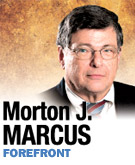Subscriber Benefit
As a subscriber you can listen to articles at work, in the car, or while you work out. Subscribe Now
 Next month, Hoosiers will vote to retain or replace their mayors. These are important elections that have statewide implications. Nearly 80 percent of all Indiana jobs are in 14 metro areas. Despite the evidence of how many counties are linked to our central cities, candidates for mayor all through the Hoosier Holyland campaign as if each city were an island.
Next month, Hoosiers will vote to retain or replace their mayors. These are important elections that have statewide implications. Nearly 80 percent of all Indiana jobs are in 14 metro areas. Despite the evidence of how many counties are linked to our central cities, candidates for mayor all through the Hoosier Holyland campaign as if each city were an island.
Some metropolitan areas are single counties. Columbus is an example. Some are multi-county crossing state lines: Evansville’s metropolitan statistical area extends into Kentucky. Some Indiana counties are in metro areas that are centered out of state; Jeffersonville and New Albany are in the Louisville metro area. Each metro, however, has an urban core and extensive inter-county commuting.
Most mayoral candidates will expand on how their No. 1 priority is jobs. They mean jobs in their city. This is misguided. They should be talking about jobs for their residents, regardless of where the jobs may be located in the metropolitan area. Yet the candidates for mayor do not emphasize—most do not even recognize the fact—that jobs and the well-being of our residents are linked with the jobs and well-being of our neighboring counties.
A favorite theme of most mayoral candidates is job training. Unless job training is specific for known jobs with waiting employers, it may be little more than a boondoggle to boost Ivy Tech Community College and the pirates of private vocational training.
Most candidates for mayor have no realistic plan for job training. They stand ready to form committees, but in today’s fiscal environment they are not prepared to commit dollars.
Labor is highly mobile. A jobs program for residents of one county will have benefits for businesses in other counties. Similarly, the gains from economic development in one county benefit citizens in neighboring counties.
Regional cooperation, however, is not a major theme of the campaigns I have followed this year.
Realism rather than regionalism should be the point here. In many instances, cities, towns and counties must stand alone in competition with their neighbors. Simultaneously, however, they need to band together statewide to overturn the myopic General Assembly’s anti-local-government record.
Many non-incumbent candidates for mayor proclaim their readiness to reduce local government red tape for business. They propose special offices, but most of the time they do not assure us their efforts will maintain regulatory standards. Due diligence by government is often seen as red tape by inexperienced and impatient business owners.
One way to reduce red tape is for the cities and towns to have a strong alliance that promotes statewide standards, licensing and practices. This does not eliminate local permitting and inspection, but there would be statewide regulations setting forth standards that meet the various conditions present throughout Indiana.
Such regulations offer consistent expectations for businesses. They must be passed by the Legislature but written by local government officials familiar with the diversity of the state.
Similarly, local government officials should be designing the state revenue and expenditure rules that govern their administrations. Indiana has top-down mandates dictated by an overreaching state government. The state can enable and encourage local governments to address imperative issues such as multi-jurisdictional fiscal sharing.
Today, local governments think in terms of how much money some project will bring to them or cost them directly. Benefits and costs to citizens are secondary to the returns to the local government. Hence, Community A does not reach out with money to help attract industry to Community B.
Have you heard from your mayoral candidates how they plan to work with neighboring communities? Do you see any mayoral candidates who might lead our metro areas into a strong statewide effort to liberate our cities and towns from their current fiscal bondage?•
__________
Marcus taught economics for more than 30 years at Indiana University and is the former director of the university’s Indiana Business Research Center. Send comments on this column to [email protected].
Please enable JavaScript to view this content.
